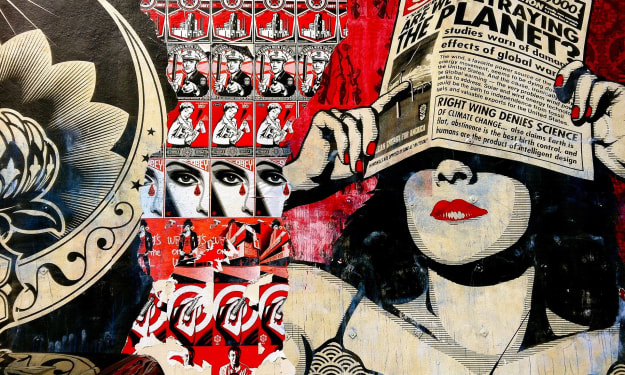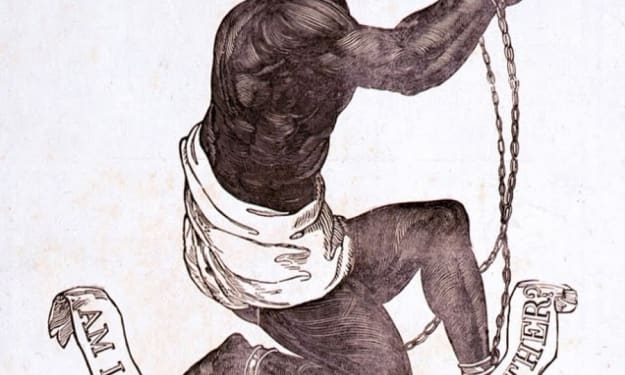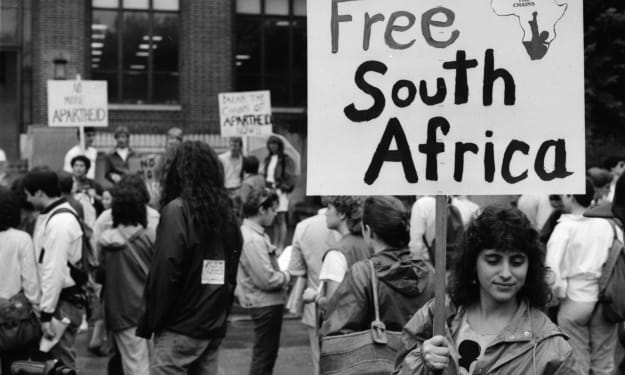history
Past politicians, legislation and political movements have changed the course of history in ways both big and small. Welcome to our blast to the past.


5 Close Calls to Nuclear War
With the possibility of North Korea constructing and using a nuclear missile against South Korea, Japan, or the United States, perhaps we should look back into history during the days of the Cold War on the five closet calls to Armageddon before and how we managed to avoid it.
Joseph PecherPublished 6 years ago in The Swamp

The Role of International Institutions in Determining the Outcome of the Events of the Kosovo War, Leading up to, and Including, the Kosovo Declaration of Independence from Serbia
Kosovo became the seventh state to declare independence from Serbia (which was a part of former Yugoslavia) on February 17th, 2008, after a war riddled with human rights violations and controversy regarding the role that international institutions such as the UN and NATO played in attempting to resolve the conflict. It had been a part of Serbia within the former Yugoslavia Confederation since 1946, but there had been tensions between the Serbian majority and Albanian minority (in Yugoslavia) for years, since Yugoslav president Slobodan Milosevic came into power (as president of Serbia from 1989-1997 and as president of Yugoslavia from 1997-2000) and had started oppressing Albanians through his nationalist policies. In July 1990, ethnic Albanians declared independence, which ultimately failed and led to Milosevic stripping the right of Kosovar autonomy laid out in the 1974 constitution and the dissolution of the government of Kosovo. In March-September 1998, after nearly five years of tensions, the Albanian Kosovo Liberation Army (KLA) and Serbian police began to engage in violent clashes which led to NATO giving president Milosevic an ultimatum to stop the brutal Serbian crackdown on Kosovar Albanians. When that didn’t happen, NATO commenced airstrikes against the Serbs and the Kosovo War continued, eventually ending in failed peace talks and a Kosovar declaration of independence from Serbia, nearly ten years later.
Chloe HolmesPublished 6 years ago in The Swamp

The Best Political Cartoons from the 1800s
Sometimes claiming to be messages to the president of their times, otherwise becoming satirical in nature of their very period, more often than not reshaping the very climate of policy and diplomacy in the range of world politics, caricatures, or cartoons, are the very promise of a smile in a time of fearful resentment. It is no different among the canals of misshapen abolitionist violence and civil unrest so associated with the 1800s, in which a time of peace soon became a time of war in many parts of the world, as with the American Civil War and the French inner-fighting between that of Bonaparte and Pitt. Though none will come as close as the satire on American politics made by the "Join or Die" cartoon drawn by none other than Benjamin Franklin, the following examples should give reference to the very quintessential of all cartoons that helped draw a line between the unfavorable and unlikable dimensions of government outreach.
Donald GrayPublished 6 years ago in The Swamp

Propaganda: Better With or Without It?
“Propaganda is indifferent to truth and truthfulness, knowledge and understanding; it is a form of strategic communication that uses any means to accomplish its ends.” (Walter Cunningham). Humanity, always going forward to the future, living in the world of present and looking in the old window of history, can track the evolution of propaganda and its transformation into various types of mass media for many different purposes. This form of information has emotional impact that attempts to shape perceptions, influencing the attitude of a population and manipulating cognitions always toward some political, ideological, or commercial causes.
Gregory SwetlyPublished 6 years ago in The Swamp- Top Story - January 2018


Donald Trump: A Refugee’s Perspective
The past few days have been unbelievably difficult for me. Watching this country, my home, the United States of America, turn into something eerily familiar and terrifying has been equal parts shocking and scary. Maybe shocking isn’t the right word because let’s be real, anyone that has truly paid attention to Donald Trump in the past year or so isn’t shocked by his actions or the most recent events. I think more than anything, I’m saddened by the amount of support he is still getting. I’m saddened by the lack of responsibility and awareness from people who put this man in office. And I’m mostly saddened by people I’ve been friends with over the years who still remain silent on these issues and this presidency. Who have I surrounded myself with the past few years? What kind of people did I grow up with? These are no friends of mine.
Dijana KunovacPublished 6 years ago in The Swamp 

Famous Political Scandals of the 1970s
With such controversies as Monica Lewinsky, Benghazi, and John McCain's inclusion among the "Keating Five," we come upon a slippery slope in American self-interests when realizing that America isn't the best place in the world. Suffice it to say, America has had more internal issues than most other countries, besides the UK or Russia, for that matter. Over the past 50 years, in themselves, have shown a good quantity of sex scandals, money laundering, and plain old political tyranny, most of which we might have never know even existed.
Donald GrayPublished 6 years ago in The Swamp

The Original Black Lives Matter
In honor of Martin Luther King Day (January 15, 2018) and the upcoming Black History Month, I thought I would write a piece about what I consider to be an original version of Black Lives Matter. The issue with African-Americans being treated like second class citizens is a touchy subject and yes, I agree with you on it being despicable that African-Americans are being killed and no one is held accountable for it or even willing to talk about it. That is why I am posting this article. For I am willing to address the issue and I fear not the outcome.
Johann HollarPublished 6 years ago in The Swamp

8 Martin Luther King Quotes That 2018 Really Needs Right Now
Famous for his speech that turned the world on its head and right back over again, Martin Luther King Jr's legacy has surpassed the life expectancy of influence on our great men and women of history. He was the pinnacle of inspiration for the likes of Americans growing up in frustration and struggle like no era has ever seen before. We saw flickers of reflections in our late president, Barack Obama, yet his replacement has brought back dark visions of times past that beg today's generation for wise words to follow. Words that only men like Mr. King could provide. In honor of MLK and the brilliant impact he has had on our society, and not just on African Americans but in the world and those who remain on it, here are 8 quotes by Martin Luther King that we should remember for 2018.
Delilah JaydePublished 6 years ago in The Swamp

Lost Treasures of History: The Amber Room
It was once considered the eighth wonder of the world: a marvelous, paneled chamber of amber mosaics and carvings that adorned Catherine the Great's Palace for over 300 years.


My Italian Immigration Story Hails from a Shithole Too
Over a century ago when my family started to immigrate from Southern Italy, I don’t doubt that established Americans thought the area was a shithole too. I’m sure they extended the sentiment to the people also. Now long acceptable as an immigration source, you’d think people like Donald Trump would know God himself didn’t welcome all those Italians—and that’s whether they came with papers or not. Of course, the President isn’t the only idiot we have, and my family story cuts across many of the same immigration issues America has wrestled with in the past.
Rich MonettiPublished 6 years ago in The Swamp

Patty Cannon: The Infamous Slave Trader of the 1800s
On Investigation Discovery, the show Deadly Women focused on a 50-year-old woman named Patty Cannon who was living in a man’s world. In 1810, in Sussex County, Delaware, Cannon was known to dress and portray herself as a man, according retired state archivist of Delaware Russ McCabe.
Darryl C. RichiePublished 6 years ago in The Swamp

The End of Apartheid in South Africa and Its Implications
The end of South African apartheid was a resounding human rights victory heard around the world. It was from the years 1948 to 1994 South Africa was under rule of systematic racial oppression that came to be known as apartheid. Twenty-three years after apartheid's abrogation, four major consequences can be noticed in the following areas: education, the economy, racism, and government. These effects were and still are wide ranging.
Kent PrionPublished 6 years ago in The Swamp























